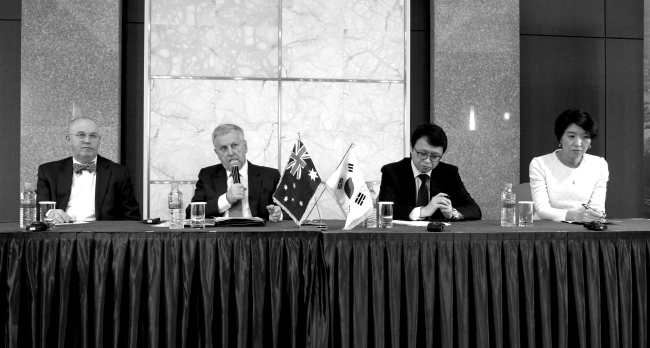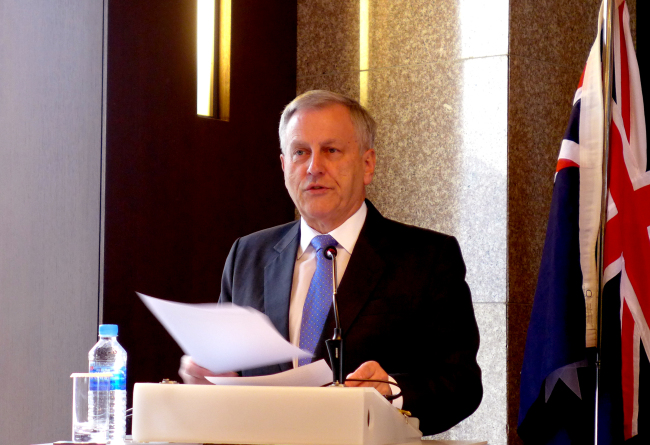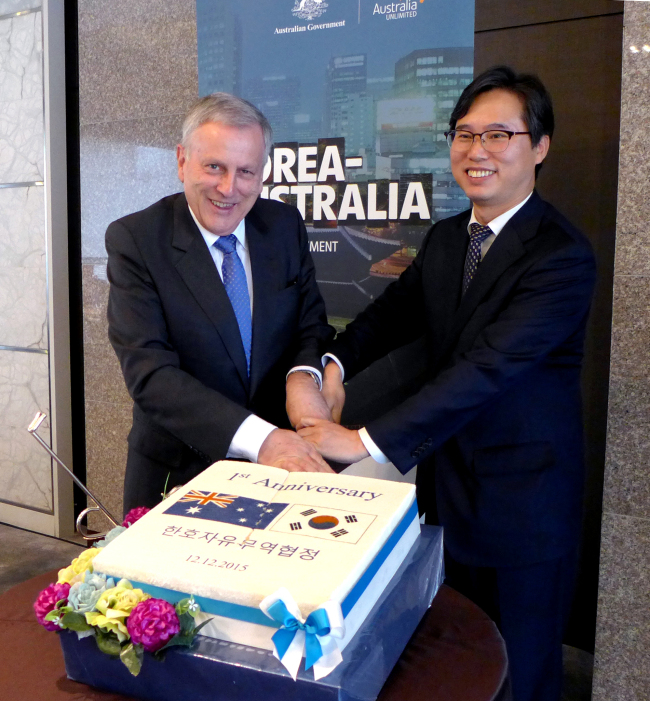Marking one year of the Korea-Australia Free Trade Agreement that entered into force on Dec. 12 last year, the Australian Embassy held a press conference last week to reflect on the deal’s positive impacts and gauge potentials for growth.
The comprehensive agreement covers a broad spectrum, including trade in goods and services, investment, technology and information sharing. Korea agreed to a 94 percent tariff reduction on goods imported and Australia consented to a 100 percent elimination.
 |
(From left) Australian Chamber of Commerce in Korea chairman Graham Dodds, Australian Ambassador William Paterson, Korea’s Ministry of Trade, Industry and Energy FTA implementation director Jeremy Shin and Korea International Trade Association research fellow Je Hyun-jung speak at a press conference marking the first anniversary of the Korea-Australia free trade agreement in Seoul on Thursday. Joel Lee/The Korea Herald |
“It’s been a big and positive year in the trading relations between our countries, critically important as we have faced sharply slowed global trade and manufacturing exports,” Australian Ambassador William Paterson said in a speech Thursday.
“Our already close bilateral relationship has continued to grow from strength to strength over broad areas. Australia is liberalizing our trade and opening our market to foreign investors, which has led to 25 consecutive years of positive economic growth.”
Since the bilateral accord went into effect, both economies have seen positive results, the ambassador said, noting that Korean exports to Australia increased by 16 percent in the first eight months of this year.
Korean consumers can also enjoy a broader range of clean and safe Australian agricultural products at competitive prices ― mussels, almonds, grapes, cherries, mangos, lamb and beef ― he said, adding that Australian wine had become more affordable.
 |
Australian Ambassador William Paterson. Joel Lee / The Korea Herald |
Australia is Korea’s eighth-largest import partner and 10th largest export market, with $31 billion in bilateral trade last year. Between January and October this year, import of Australian beef increased by some 45 percent from the previous year, while the export of Korean cars rose by nearly 10 percent, according to the Korea International Trade Association research fellow Je Hyun-jung at the venue.
“The goods trade is only a part of the KAFTA story,” Paterson stressed. “In the longer term, the real benefits lie in services and investment.”
Trade in services currently lags behind the trade in goods, accounting for 7 percent of the KAFTA, the envoy noted. The two-way investment was also low given the two economies’ sizes, according to him.
“To reap the benefits of trade in services, it is essential for both governments to eliminate unnecessary regulations and ensure a level playing field for new entrants.”
The diplomat expressed desire for greater cooperation in education, tourism, legal and investment services, pointing out that many Australian universities are ranked in the world’s top 100; the Australian dollar has slipped in value and become cost-competitive; flights to Australia have increased, with Korean tourists expected to reach 200,000 by year’s end; and Australian asset management and legal firms can provide quality services.
 |
Australian Ambassador William Paterson (left) and Park Jin-kyu, the director general of the trade policy bureau at Korea's Trade, Industry and Energy Ministry. Joel Lee / The Korea Herald |
Park Jin-kyu, the director general of the trade policy bureau at Korea’s Trade, Industry and Energy Ministry, said in a speech that Australia has knocked down tariffs on Korea’s main export items of electronic appliances and cars, while Korea has gradually eliminated duties on imported Australian agricultural products, due to domestic sensitivities.
The two countries agreed to cooperate more on trading bituminous coal, iron ore and unwrought aluminum, he added.
“Both countries are cooperating through various regional economic forums such as the Asia-Pacific Economic Cooperation, Asia Development Bank, Asia Infrastructure Investment Bank and Regional Comprehensive Economic Partnership,” Park said. “We are also cementing our diplomatic alliances through MIKTA (the association of middle powers Mexico, Indonesia, South Korea, Turkey and Australia), G-20 and the East Asia Summit.”
The third round of tariff reductions will be implemented on Jan. 1 next year.
By Joel Lee (
joel@heraldcorp.com)










![[Herald Interview] How Gopizza got big in India](http://res.heraldm.com/phpwas/restmb_idxmake.php?idx=644&simg=/content/image/2024/11/20/20241120050057_0.jpg)